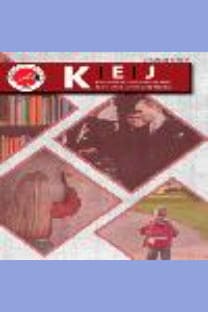ORTAOKUL MATEMATİK ÖĞRETMENLERİNİN ÖĞRETİMSEL UYGULAMALARINDAKİ ETİK DEĞERLENDİRMELERİ: EKLEKTİK BİR DEĞERLENDİRME SÜRECİ
Matematik öğretimi, öğretmen karar süreci, etik değerlendirme
___
- Barrett, D. E., Casey, J. E., Visser, R. D., & Headley, K. N. (2012). How do teachers make judgments about ethical and unethical behaviors? Toward the development of a code of conduct for teachers. Teaching and Teacher Education, 28(6), 890-898.
- Beswick, K. (2012). Teachers' beliefs about school mathematics and mathematicians' mathematics and their relationship to practice. Educational Studies in Mathematics, 79(1), 127-147.
- Bishop, A., Seah, W. T., & Chin, C. (2003). Values in mathematics teaching-The hidden persuaders? In Second international handbook of mathematics education (pp. 717-765). Springer, Dordrecht.
- Boylan, M. (2016). Ethical dimensions of mathematics education. Educational Studies in Mathematics, 92(3), 395-409. Bucholz, J. L., Keller, C. L., & Brady, M. P. (2007). Teachers' Ethical Dilemmas: What Would You Do? Teaching Exceptional Children, 40(2), 60-64.
- Chan, Y. C., & Wong, N. Y. (2014). Worldviews, religions, and beliefs about teaching and learning: perception of mathematics teachers with different religious backgrounds. Educational Studies in Mathematics, 87(3), 251-277.
- Christie, T., Groarke, L., & Sweet, W. (2008). Virtue ethics as an alternative to deontological and consequential reasoning in the harm reduction debate. International Journal of Drug Policy, 19(1), 52-58.
- Creswell, J. W. (2013). Qualitative inquiry and research method: Choosing among five approaches. Los Angeles, CA.
- Develaki, M. (2008). Social and ethical dimension of the natural sciences, complex problems of the age, interdisciplinarily, and the contribution of education. Science &Education, 17(8-9), 873-888.
- Fenech, M., &Lotz, M. (2018). Systems advocacy in the professional practice of early childhood teachers: from the antithetical to the ethical. Early Years, 38(1), 19-34.
- Fisher, Y. (2013). Exploration of values: Israel teachers’ professional ethics. Social Psychology of Education, 16(2), 297-315.
- Gates, P. (2006). Going beyond belief systems: Exploring a model for the social influence on mathematics teacher beliefs. Educational Studies in Mathematics, 63(3), 347-369.
- Glaser, B., G., and Strauss, A., L. (1967). The discovery of grounded theory: Strategies for qualitative research: New York: Aldine de Gruyter.
- Herbst, P., &Chazan, D. (2011). Research on practical rationality: Studying the justification of actions in mathematics teaching. The Mathematics Enthusiast, 8(3), 405-462.
- Hollanders, H. (1999). Eclecticism and integration in counselling: implications for training. British Journal of Guidance and Counselling, 27(4), 483-500.
- Hunt, S. D., & Vitell, S. (1986). A general theory of marketing ethics. Journal of Macromarketing, 6(1), 5-16.
- Jameton A. (1984) Nursing Practice: The Ethical Issues. Prentice Hall, Englewood Cliffs, NJ.
- Kälvemark, S., Höglund, A. T., Hansson, M. G., Westerholm, P., &Arnetz, B. (2004). Living with conflicts- ethical dilemma sand moral distress in the health care system. Social science&medicine, 58(6), 1075- 1084.
- Kant, I. (2007). Ethica: Etik Üzerine Dersler. O. Özügül. (Çev.). İstanbul: Pencere Yayınları.
- Kidder, R. M. (1995). How good people make tough choices. New York: Morrow.
- Kuçuradi, İ. (2015). Etik. Türkiye Felsefe Kurumu.
- Kuntze, S. (2012). Pedagogical content beliefs: global, content domain-related and situation-specific components. Educational Studies in Mathematics, 79(2), 273-292.
- Maxwell, B.,&Schwimmer, M. (2016). Seeking the elusive ethical base of teacher professionalism in Canadian codes of ethics. Teaching and Teacher Education, 59, 468-480. Millî Eğitim Bakanlığı. (2015). Genelge. Eğitimciler için mesleki etik ilkeler. http://personel.meb.gov.tr/genelge_gorus_yonerge/ET%C4%B0K%20GENELGE.pdf (Erişimtarihi:28 Nisan 2017)
- Neyland, J. (2004). Toward a postmodern ethics of mathematics education. Mathematics Education with in the Postmodern, 55-73.
- National Education Association. (2011). NEA home. Retrieved from http://www.nea.org/home/30442.htm (Erişim tarihi: 30 Mayıs 2017)
- Noddings, N. (2012). The caring relation in teaching. Oxford Review of Education, 38(6), 771-781.
- OECD, T. (2016). Supporting Teacher Professionalism. Insights from TALIS 2013. https://www.oecd.org/publications/supporting-teacher-professionalism-9789264248601-en.htm. (Erişim tarihi: 18 Kasım 2017)
- Santagata, R., &Yeh, C. (2016). The role of perception, interpretation, and decision making in the development of beginning teachers’ competence. ZDM, 48(1-2), 153-165.
- Schoenfeld, A. H. (2011). Toward professional development for teachers grounded in a theory of decision making. ZDM, 43(4), 457-469.
- Shapira-Lishchinsky, O. (2011). Teachers’ critical incidents: Ethical dilemmas in teaching practice. Teaching and Teacher Education, 27(3), 648-656.
- Shapiro, J. P., &Stefkovich, J. A. (2016). Ethical leadership and decision making in education: applying theoretical perspectives to complex dilemmas (4th. Ed.). Routledge.
- Stockall, N.,&Dennis, L. R. (2015). Seven basic steps to solving ethical dilemmas in special education: A decision-making framework. Education and Treatment of Children, 38(3), 329-344.
- Wadeson, H. (2001). An eclectic approach to art therapy. Approaches to art therapy: Theory and technique, 306-317.
- Walshaw, M. . (2013). Post-structuralism and ethical practical action: Issues of identity and power Journal for Research in Mathematics Education, 44(1), 100-118.
- Wilkinson, J. M. (1987, April). Moral distress in nursing practice: experience and effect. In nursing forum (Vol. 23, No. 1, pp. 16-29). Oxford, UK: Blackwell Publishing Ltd.
- Willey, S. L., Mansfield, N. R., & Sherman, M. B. (2012). Integrating ethics across the curriculum: A pilot study to assess students’ ethical reasoning. Journal of Legal Studies Education, 29(2), 263-296.
- Williams, J. R. (2005). Medical ethics manual. World Medical Association. https://www.wma.net/wp-content/uploads/2016/11/Ethics_manual_3rd_Nov2015_en.pdf (Erişimtarihi: 22 Temmuz 2018)
- Yang, X., Kaiser, G., König, J., &Blömeke, S. (2019). Professional Noticing of Mathematics Teachers: a Comparative Study between Germany and China. International Journal of Science and Mathematics Education, 17(5), 943-963.
- Yin, R. K. (2003). Case study research: Design and methods. Sage publications.
- Zierer, K. (2011). Pedagogical eclecticism. The Journal of Educational Thought (JET)/Revue de la Pensée Educative, 3-19.
- ISSN: 1300-8811
- Yayın Aralığı: 4
- Başlangıç: 1992
- Yayıncı: -
Lisans 1. Sınıf Öğrencilerinin Üniversite Yaşamına Uyum Sürecinde Akran Danışmanlarının Rolü
Semra KİYE, Orhan YONCALIK, Serap NAZLI
Yavuz DEMİREL, Eray AKTEPE, Enes Uğur TOHUM
Yavuz DEMİREL, Eray AKTEPE, Enes Uğur TOHUM
Binnaz KIRAN, Binaz BOZKUR, Özge CENGİZ
Ortaokul Öğrencilerinde Olumlu Davranış Kazandırmaya Yönelik Psiko-Eğitim Programı
Ali SONKUR, GÖKÇEN AYDIN, Aysel Kadı DÖNDER
Selcan SUNGUR ALHAN, Ümit ŞİMŞEK
Binaz BOZKUR, Binnaz KIRAN, Özge CENGİZ
Sınıf Yönetiminde Disipline İlişkin Öğretmen ve Okul Yöneticisi Görüşler
Bilim Fuarlarına Katılımın Ortaokul Öğrencilerinin Fene Yönelik Tutumlarına Etkisi
